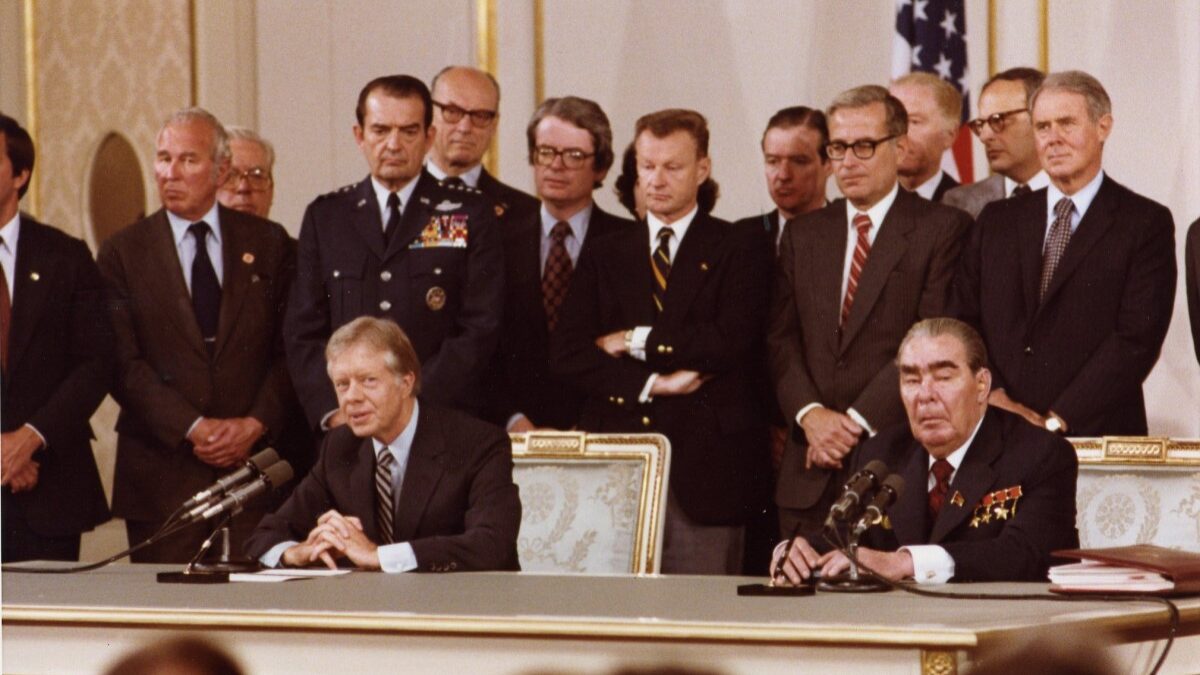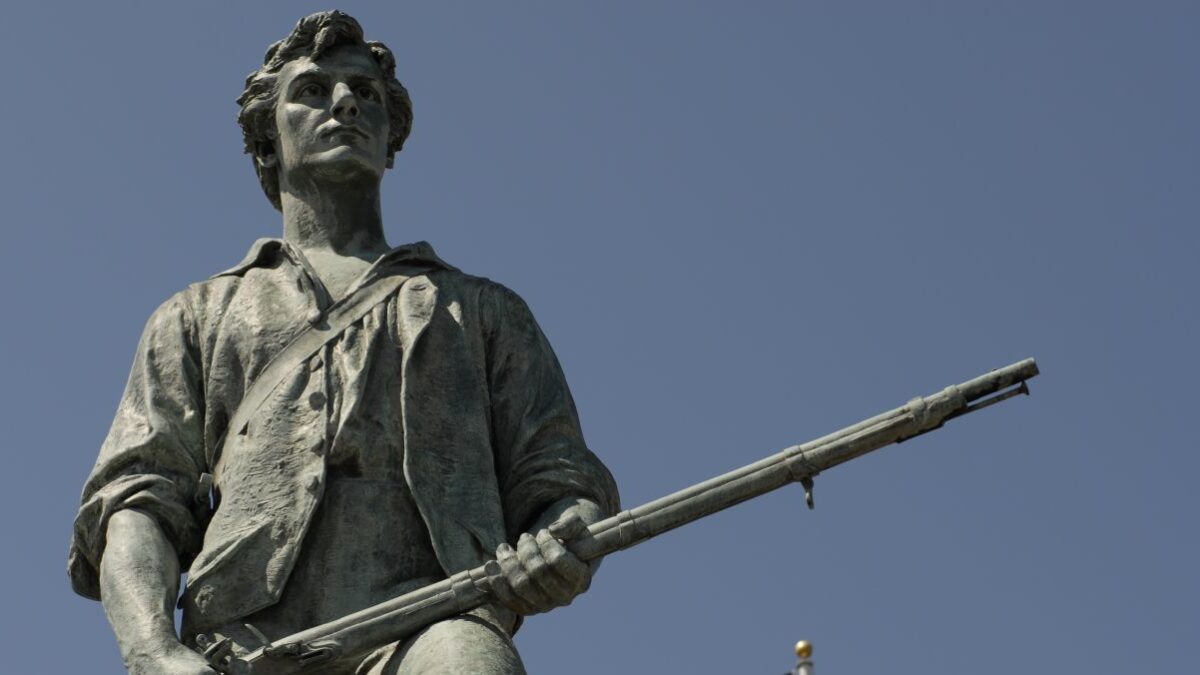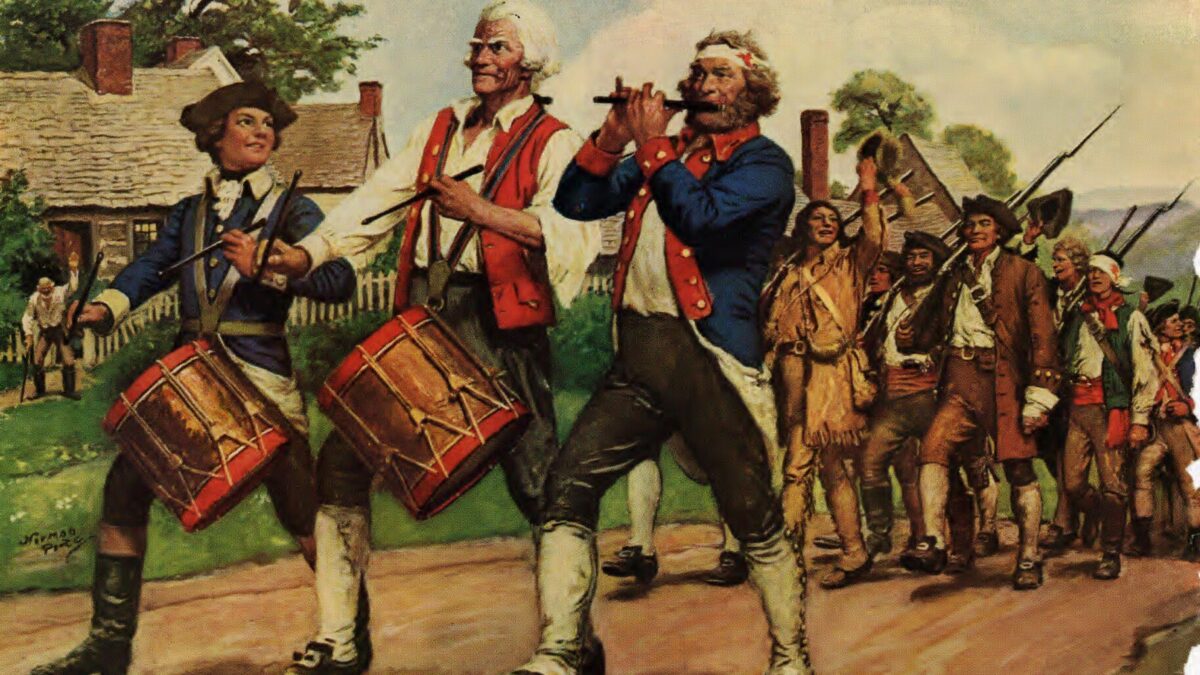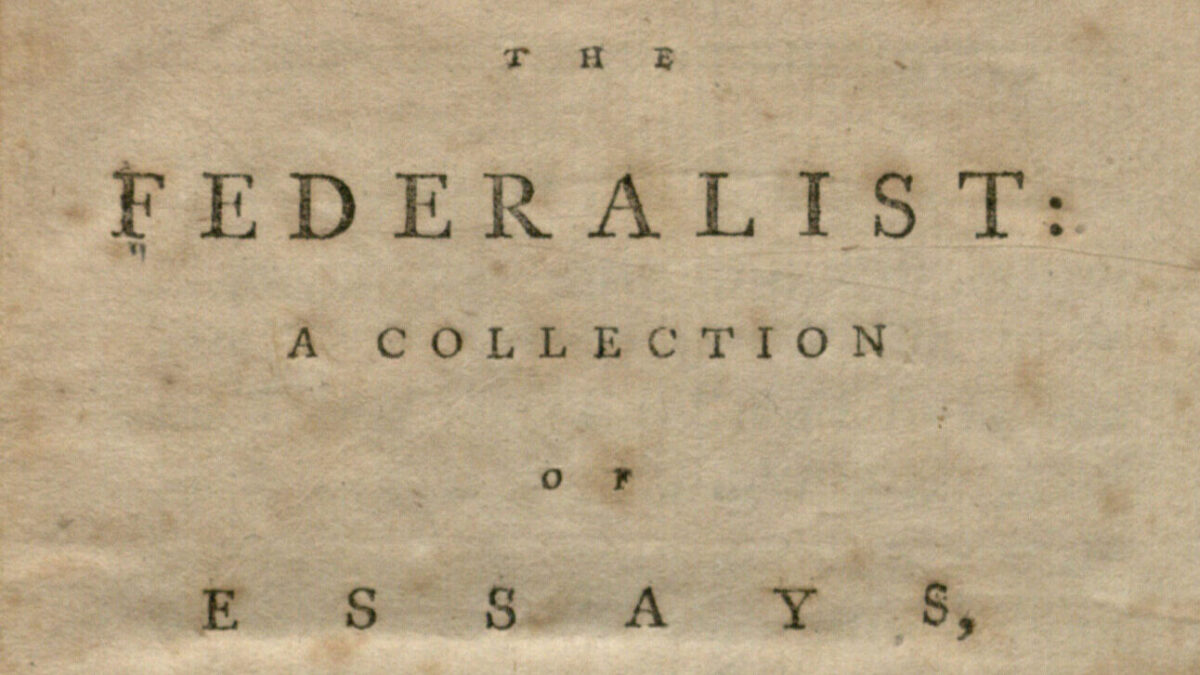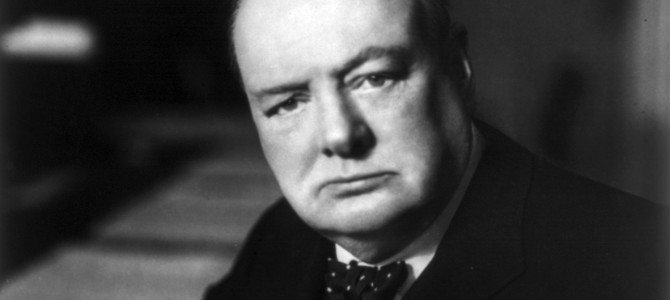
Winston Churchill is in the news, as is often the case. On February 11, presidential candidate Bernie Sanders praised Churchill’s war leadership. Afterwards, Vox’s Amanda Taub criticized him and Churchill in sharp language. Are their criticisms of Churchill true?
During the Democrat primary debate on February 11, moderator Judy Woodruff asked the candidates to name two leaders, one American and one foreign, who would influence their policy decisions. Sanders chose Franklin Roosevelt and Winston Churchill. Fair enough; they saved western civilization. Many politicians from Left to Right praise Churchill. So many members of Parliament touch the toe of his House of Commons statue for luck that they are wearing out the bronze.
But Taub wasn’t buying. Sanders “started strong” with Roosevelt, she wrote, although he skipped foreign policy and concentrated on the New Deal in the Depression. She said nothing about FDR’s high words of praise for Churchill. Those words were spoken and written in quantity throughout the largest war in history, which they fought together.
But Churchill? Of course, he mounted the effort to defeat Hitler, but Sanders put his credibility on the line in praising “a chemical weapons enthusiast and unreconstructed racist who cut a swath of suffering and death…” Churchill’s fight against tyranny in Europe “doesn’t look quite as principled when contrasted with his commitment to maintaining it elsewhere.”
In this article, Vox offered a familiar litany of Churchill sins, most of which reputable historians have long since refuted. Here they are—with replies.
1. Winston Churchill Didn’t Relieve the Famine in India
Taub: “India was then a British colony and so was subject to British rule on matters of grain imports and exports, which meant it was at Churchill’s mercy when it came to famine relief. That mercy turned out to be limited.” Historian Arthur Herman refuted charges over Churchill’s part in the Bengal famine years ago in his Pulitzer-nominated “Gandhi and Churchill.” Also, see: “Did Churchill Cause the Bengal Famine?”
It is a fact that millions of Indians starved. It is a fact that India was at the time a member of the British Empire (as it is today a self-governing member of the British Commonwealth; Britain laid the ground for this by establishing institutions of self-government in India that had not existed before the British came).
It is also a fact that Britain under Churchill, along with other countries, shipped hundreds of thousands of tons of grain to India to replace the deficiency. The shortage was caused by crop failures and the Japanese invasion of Burma and nearby countries that had previously supplied rice to India. Herman concludes that without Churchill the Bengal famine would have been worse. Vox doesn’t mention the effects on food supplies of Japanese incursions, corrupt local officials, and merchants who hoarded grain in the hope of higher prices.
Instead we are given Churchill statements made in moments of exasperation: “I hate Indians. They are a beastly people with a beastly religion.” We are not told that Churchill said this after learning that Indian separatists were urging only passive resistance to Japanese invaders. His outburst is often quoted to suggest his supposed racism—which is denied by his friendships with such Indians as Birla and Nehru (whom he called “the light of Asia”); or his final words of encouragement to Gandhi (see “Churchill on India”).
Critics who offer isolated, out-of-context quotes as broad statements of opinion would not credit Churchill for any balancing remarks—so we will. From the War Cabinet meeting of 24 April 1944: “The Prime Minister said that it was clear that His Majesty’s Government could only provide further relief for the Indian situation at the cost of incurring grave difficulties in other directions….At the same time his sympathy was great for the sufferings of the people of India.”
Such statements, not outbursts in moments of wartime exasperation, represent Churchill’s true views on India. After the separation of India and Pakistan in 1948, he declared: “An awful tragedy has already occurred. At least 400,000 men and women have slaughtered each other in the Punjab alone.”1 See also: “Churchill on Gandhi’s Death.”
2. Support for Using ‘Poison Gas’ Against Enemies
Taub: “In 1919, Churchill declared that he was ‘strongly in favour of using poisoned gas against uncivilised tribes,’ and enthusiastically supported its use against ‘Bolshies’ in Russia….the Guardian reports that ‘Bolshevik soldiers were seen fleeing in panic as the green chemical gas drifted towards them. Those caught in the cloud vomited blood, then collapsed unconscious.’”
Reality: After World War I, Britain’s military wished to use gas against rebel tribesmen in Northwest India and Mesopotamia, now Iraq. No one proposed to use chlorine or phosgene. But Churchill, as minister of war, confused the matter when he used the term “poison gas”: “It is sheer affectation to lacerate a man with the poisonous fragment of a bursting shell and to boggle at making his eyes water by means of lachrymatory gas. I am strongly in favour of using poisoned gas against uncivilised tribes….the loss of life should be reduced to a minimum.”
“Lachrymatory gas” is, of course, tear gas. It was, Churchill said, “a more merciful weapon than high explosive shell, and compels an enemy to accept a decision with less loss of life than any other agency of war….There can be no conceivable reason why it should not be resorted to.”
The Guardian article on using gas against “Bolshies” that Vox quotes involves a more toxic agent called diphenylaminechloroarsine [DM]—much tougher than tear gas, but not broadly life-threatening. Still, if Churchill actually countenanced dropping DM on Russian civilians, he is certainly culpable. But he did not. The Guardian was quoting a 1999 Imperial War Museum Review article that quite confused the situation. Churchill did authorize a general at Archangel, Russia, to use DM in battle—for the same reason he always cited in that regard: the enemy used it first. (The Bolsheviks were firing German gas shells recovered from World War I battlefields.)
Nowhere, however, did the Guardian or IWMR say anything about deaths, or civilian casualties. In a September 1919 attack, for example, “ten Bolsheviks were affected.” British troops were advised that in the event of accidentally inhaling DM, “cigarette smoking would give relief.” DM was quickly dropped. Reading the IWMR article, DM comes off as an ugly, disgusting, but generally non-lethal advance on tear gas. Reading Vox, it sounds like chlorine. Big difference; big exaggeration.
Through World War II, Churchill’s view was consistent: “Nothing could be more repugnant to our feelings than the use of poison gas, but there is no logic at all behind the argument that it is quite proper in war to lay a man low with high-explosive shell, fragments of which inflict poisonous and festering wounds, and altogether immoral to give him a burn with corrosive gas or make him cough and sneeze….The attitude of the British Government has always been to abhor the employment of poison gas. As I understand it, our only procedure is to keep alive such means of studying this subject as shall not put us at a hopeless disadvantage if, by any chance, it were used against us by other people.”
Neither the Germans nor Allies used gas in World War II. Churchill was content with that stand-off, but was prepared to use it ruthlessly if the enemy used it first. For a complete review of this subject, see “Churchill and Chemical Warfare.”
3. Churchill Created the Irish Black and Tans
Taub: “In the 1920s, as the British secretary of state for war, Churchill created the notorious “Black and Tans,” in Ireland, a paramilitary militia that he recruited to maintain British control and suppress the IRA. That strategy backfired: The Black and Tans were so violent toward Irish civilians that they provoked popular anger and likely ended up increasing support for independence.”
That is neither accurate nor representative of Churchill. Paul Addison, a balanced historian, wrote that Churchill “seems to have played no part in the initial decision to recruit them. As secretary for war, Churchill had been preoccupied throughout 1919 by his crusade against Bolshevism. It was not until January 1920…that he realized the state of chaos in Ireland….
“Churchill wrote of the Black and Tans: ‘…When any of their own men or police or military comrades were murdered they beat up the haunts of wellknown malignants, or those whom they conceived to be malignants, and sharply challenged suspected persons at the pistol’s point. Obviously there can be no defence for such conduct except the kind of attack to which it was a reply.’”
Addison notes that Churchill here was less than candid: that “in carrying out reprisals the Black and Tans sometimes murdered innocent people….Realizing that their activities were getting out of hand, Churchill swung round to the view that it would be better to pursue a policy of official reprisals in order to avoid ‘excesses.’
“Students of Churchill are familiar with his lifelong tendency to seek victory as the prelude to a magnanimous settlement with the defeated party….On 23 July 1920, he proposed to the cabinet a whole series of coercive measures in Ireland….He was quite prepared to go much further with concessions…but he was not prepared to make these concessions at a time when they would be claimed as a victory for the Sinn Feiners.”2
Churchill did not personally propose the Black and Tans, although he stubbornly defended them despite atrocities that exceeded their remit. Against that, he must also be credited with a leading role in forging Ireland’s independence.
Numerous biographers have recounted this story. It was Churchill who somehow brought the warring parties together: not only the Lloyd George government and the Irish revolutionaries, but also the rebels and the determinedly loyal Ulster unionists.
Doggedly, Churchill pursued the goal, working out the compromises. When Sinn Fein’s Michael Collins complained that the British had put a price on his head, Churchill showed him his framed copy of the Boer wanted poster for the escaped Winston Churchill in 1899: “At any rate it was a good price—£5000. Look at me—£25 dead or alive. How would you like that?”
Collins read the paper and “broke into a hearty laugh. All his irritation vanished. We had a really serviceable conversation, and thereafter—though I must admit that deep in my heart there was a certain gulf between us—we never to the best of my belief lost the basis of a common understanding.” Collins signed the Irish Treaty, and with it, he predicted, his death warrant. He was proven right—gunned down by an assassin in 1922. His last message to Churchill, sent through a friend under stress of a presentiment of the end, was: “Tell Winston we could never have done without him.”3
4. ‘Brutally Suppressing’ the Mau Mau in Kenya
Taub: “When Churchill returned as prime minister in postwar Britain, he presided over the brutal suppression of Kenya’s anti-colonial Mau Mau rebellion, in which Britain herded thousands of people into concentration camps that the Harvard historian Catherine Elkins has described as ‘Britain’s gulags’….Churchill’s government was well aware of what was happening but failed to stop it….Kenya and India are still dealing with the economic and political burdens of British rule.”
Vox’s source is questionable. Elkins was criticized for sensationalism and imbalance; for example, she omits the Mau Mau atrocities, which if anything were worse than those of the British. The historian David Anderson has written that the “compulsory resettlement” in concentration camps was punitive, “to punish Mau Mau sympathisers.”4
Neither was the Mau Mau rebellion a popular uprising. It had as many or more opponents among the native population as supporters. There is no doubt that the colonial government indulged in atrocities, and Churchill as head of government bears ultimate responsibility. At the same time, Vox’s charges are highly biased. Jomo Kenyatta, the father of modern Kenya and no fan of the British Empire, said, for example: “Mau Mau was a disease which had been eradicated, and must never be remembered again.”5
A more honest appraisal might consider that Churchill’s main foreign preoccupation at that time (especially after the death of Stalin) was a “settlement” of the Cold War, despite President Eisenhower’s manifest reluctance. His preoccupation, in other words, was world peace.
Indeed, examining the Gilbert Papers yields only two instances where Churchill spoke in Cabinet about Kenya, both in 1953. On March 6, he suggested a display of aircraft over Mau Mau areas: “The more often they saw an aircraft overhead, the more they would feel that all their movements were under observation.”
On May 21, Churchill said: “care should be taken to avoid the simultaneous execution of any large number of persons who might be sentenced to death by [Kenyan] courts. Public opinion in this country would be critical of anything resembling mass executions.” Colonial Secretary Oliver Lyttleton replied that “there would be no question of executing anyone who had not been tried and convicted on a capital charge by due process of law.”6
These are only comments we can find by Churchill on the Kenya uprising. The reader may decide if this reveals “an unreconstructed racist who cut a swath of suffering and death,” in Vox’s kind words.
Winston Churchill’s Defense Rests
It is true that Churchill used words like “blackamoors” and said Indians “breed like rabbits”—offenses, in modern convention, of genocidal magnitude. In his time, of course, every Briton from the sovereign to a Covent Garden grocer said such things. That may be shocking in a more enlightened age. But that is the way it was.
Yet this is the same Churchill who demanded equal rights for black South Africans 1899; who endeared himself to Gandhi by defending the Indian minority in South Africa in 1906; who endorsed the concept of a Jewish national home, and praised the contributions of Jews to civilization in 1920; who would admire the democratic forms that emerged in India, Kenya, and elsewhere, through British influence.
Winston Churchill was no saint, and it is a disservice to pretend he was. But he is too complex a figure to be pigeonholed by writers who criticize without considering the full picture. As Manchester wrote, Churchill “always had second and third thoughts, and they usually improved as he went along. It was part of his pattern of response to any political issue that while his early reactions were often emotional, and even unworthy of him, they were usually succeeded by reason and generosity.”7
1 Forthcoming, Winston S. Churchill: Document Volume vol. 19, September 1943-April 1944.
2 Paul Addison, “The Search for Peace in Ireland,” in James W. Muller, ed., Churchill as Peacemaker (Cambridge: Cambridge University Press, 2003), 199-200.
3 Hugh Martin, Battle: The Life Story of the Rt. Hon. Winston S. Churchill (London: Sampson, Low, 1932), 200. For a full account see Winston S. Churchill, “How We Made the Irish Treaty” in Thoughts and Adventures (Wilmington, Del.: Intercollegiate Studies Institute Press, 2009).
4 David Anderson, Histories of the Hanged: The Dirty War in Kenya and the End of Empire (London: Weidenfeld & Nicolson, 2005), 294. David Elstein, “Letters: Tell me where I’m wrong,” London Review of Books 27 (11 and 14). 2005.
5 Jomo Kenyatta, April 1963, in Marshall Clough, Mau Mau Memoirs (Colorado: Rienner, 1998), 25
6 Minutes, Cabinet Defence Committee, 6 March and 21 May 1953, CAB 131/13. Gilbert Papers assembled for the forthcoming Winston S. Churchill: Document Volume 22, 1951-1955, to be published by Hillsdale College Press.
7 William Manchester, The Last Lion: Winston Spencer Churchill, vol. 1, Visions of Glory 1874-1932 (Boston: Little Brown, 1982), 844.


